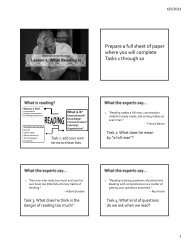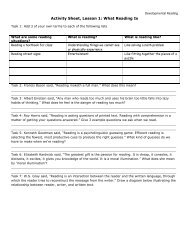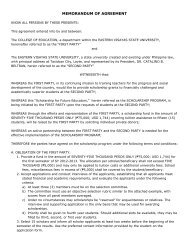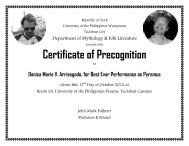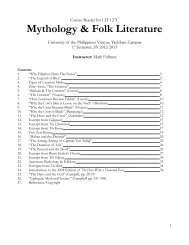Literacy in the Facebook Era - Waray Dictionary and Language ...
Literacy in the Facebook Era - Waray Dictionary and Language ...
Literacy in the Facebook Era - Waray Dictionary and Language ...
Create successful ePaper yourself
Turn your PDF publications into a flip-book with our unique Google optimized e-Paper software.
Fullmer 7<br />
But <strong>the</strong>re is ano<strong>the</strong>r side to <strong>the</strong> debate. O<strong>the</strong>rs feel that <strong>the</strong> types of read<strong>in</strong>g <strong>and</strong> writ<strong>in</strong>g we<br />
do onl<strong>in</strong>e are actually pos<strong>in</strong>g new cognitive challenges that force our bra<strong>in</strong>s to become better at<br />
read<strong>in</strong>g comprehension. Cognitively speak<strong>in</strong>g, a person’s ability to produce st<strong>and</strong>ard spell<strong>in</strong>g is a<br />
different skillet than <strong>the</strong> ability to comprehend a text or compose a passage. Spell<strong>in</strong>g is pure<br />
memorization; comprehension is an <strong>in</strong>terpretive skill <strong>and</strong> requires facility at phonemic awareness,<br />
phonics, vocabulary, <strong>and</strong> fluency (Bernardo, p.7).<br />
One researcher who sees <strong>in</strong>ternet English positively is David Crystal (2008) who argues that<br />
“text<strong>in</strong>g improves people’s literacy as it provides more opportunity to engage with <strong>the</strong> language<br />
through read<strong>in</strong>g <strong>and</strong> writ<strong>in</strong>g.” In o<strong>the</strong>r words, given that this style of writ<strong>in</strong>g is much more varied, it<br />
requires <strong>the</strong> reader to have broader <strong>and</strong> more diverse read<strong>in</strong>g comprehension abilities.<br />
Crystal’s research also tries to correct some of <strong>the</strong> notions we have about <strong>the</strong> nature of<br />
<strong>in</strong>ternet English. He asserts <strong>the</strong> follow<strong>in</strong>g:<br />
• Abbreviations are not a new th<strong>in</strong>g: <strong>the</strong>y have always been part of written <strong>and</strong> spoken<br />
language.<br />
• On average, only 10 percent of words are abbreviated <strong>in</strong> text messages.<br />
• Text<strong>in</strong>g does not cause bad spell<strong>in</strong>g because people need to know how to spell<br />
before <strong>the</strong>y can text.<br />
I would add that text<strong>in</strong>g is not a “dumbed down” version of English. Emoticons <strong>and</strong> o<strong>the</strong>r textual<br />
devices carry a complex array of l<strong>in</strong>guistic nuances <strong>and</strong> connotations, <strong>and</strong> abbreviations require<br />
texters to be <strong>in</strong>ventive <strong>and</strong> creative. As a texter myself, I am well aware of <strong>the</strong> mean<strong>in</strong>g an extra<br />
exclamation po<strong>in</strong>t or :) will carry.<br />
These observations serve to make us as teachers recalibrate ourselves to <strong>the</strong> discourse<br />
students are us<strong>in</strong>g outside of <strong>the</strong> classroom: as distasteful as <strong>the</strong> ideas is to educators, l<strong>in</strong>guists will<br />
rem<strong>in</strong>d us that <strong>in</strong>ternet English is not <strong>in</strong>ferior to st<strong>and</strong>ard English, but simply ano<strong>the</strong>r dialect with its<br />
own complexities. (That said, I acknowledge that students need to learn st<strong>and</strong>ard English to be<br />
globally competitive).<br />
In short, we have to correct our belief that students’ English skills are worsen<strong>in</strong>g. Roger<br />
Thompson reports a study conducted <strong>in</strong> 1993 which aimed to gauge Filip<strong>in</strong>os’ fluency with <strong>the</strong><br />
English language. There was a clear correlation between age <strong>and</strong> literacy: <strong>the</strong> older <strong>the</strong> respondent,<br />
<strong>the</strong> lower <strong>the</strong> ability to use English. Of those <strong>in</strong> <strong>the</strong> 17-24 age group, 77 percent read English, 68<br />
percent write English, 82 percent underst<strong>and</strong> spoken English, 63 percent speak English, <strong>and</strong> 54<br />
percent th<strong>in</strong>k <strong>in</strong> English. The result, he writes, “contradicts <strong>the</strong> current perception that <strong>the</strong> golden



